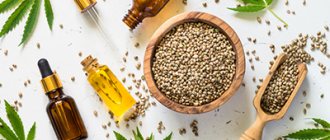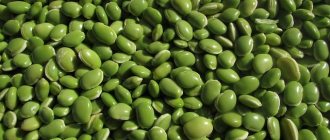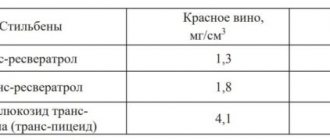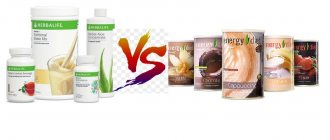Compound
The composition of different drugs varies depending on which pharmaceutical company produces them.
For example, VitaLine Lecithin, produced in granules, contains a natural soy-based lecithin extract. The substance is 98% composed of phosphatides , including but not limited to: linoleic acid, phosphatidylcholine, phosphatidylethanolamine, linolenic acid, phosphatidylinositol).
One capsule of Lecithin NSP (NSP) contains 0.52 g of purified lecithin concentrate, which is obtained from soybean oil. Approximately 95-97% of the substance consists of biologically active principles - polyunsaturated fatty acids and phospholipids .
One capsule of Lecithin Nash contains 0.45 g of sunflower lecithin, as well as 0.8% monoglycerides and 0.6% moisture. The active component of the drug is produced from sunflower seeds using an original patented technology, which makes it possible to obtain a highly purified (98.6%), immunologically and environmentally safe substance.
The Doppelhertz Lecithin capsule contains 0.5 g of the active substance, as well as a complex of vitamins (including vitamins, B12, PP ).
The capsule of the drug Coral Lecithin (from the Coral Club) contains 1.2 g of liquid soy lecithin.
general information
The name lecithin comes from the Greek word for “egg yolk,” from which the pure molecule was first isolated. This name has 2 meanings:
- Lecithin, as a synonym for phosphatidylcholine, is used in biochemistry and belongs to the group of chemical fat-like substances that are found in natural sources. The compound consists of choline, saturated fatty acids and phosphoric acids.
- Lecithin as a food additive. The commercial name of the substance suggests the presence of other components - soybean oils, vitamins, carbohydrates.
Now Foods, Sunflower Lecithin, 1,200 mg, 200 Softgels
892 rub.
More details
History of the study
The discovery of the substance took place in 1850, when the French chemist Maurice Gobley isolated the pure substance from chicken yolk. Animal lecithin has been used in the food industry for a long time. In the 30s of the twentieth century, scientists found a way to extract the substance from soybeans, which significantly reduced the cost of production.
Doctors' interest in the benefits of lecithin for humans resumed in 1958. During this period, American researcher Lester Morrison published the results of an experiment that showed a decrease in cholesterol levels in patients with atherosclerosis when taking lecithin in high doses. Another American doctor, David Druling from New York, showed that daily consumption of the vitamin in a dose of 13 g can reduce the number of painful attacks in patients with gallstone disease.
Pharmacodynamics and pharmacokinetics
The main components of lecithin - choline and inositol - are substances that are vital for ensuring proper brain .
Choline is responsible for intellectual activity, coordination of muscle contractions, and creative activity. In addition, choline promotes the formation of short-term (working) memory and its retention.
Inositol has a beneficial effect on mood, the ability to navigate in space, and behavior. The substance helps reduce nervousness and irritability and has a calming effect.
A sufficient content of lecithin in food products can reduce cholesterol in the blood and the frequency of contractions of the heart muscle , promotes blood , reduces the tone of the walls of blood vessels , improves blood pressure and blood supply to various organs and tissues .
The substance takes an active part in the regulation of lipid metabolism in the body , stimulating the breakdown of lipids into simple fatty acids . In the presence of lecithin, fats are quickly removed from the liver and enter the internal organs and fat depots.
In addition, its use accelerates the restoration of liver cells damaged by exposure to alcohol, nicotine, narcotic substances, food colorings and preservatives, and medications.
The substance plays an important role in increasing the body's defenses: it helps restore the function of lymphocytes and mononuclear phagocytes , due to the production of antibodies, it increases the body's resistance to diseases, stimulates the growth and activity of phagocytes .
Lecithin activates reproductive function, improves nutrition and detoxification processes, restores damaged skin cells and stimulates the formation of new ones, protects the skin from the effects of free radicals, helps normalize weight, stimulates the production of bile and prevents the formation of gallstones, prevents the development of cirrhosis due to alcohol abuse, stimulates processes of absorption of vitamins A, , K and in the digestive tract.
The beneficial properties of the substance make it indispensable for pregnant women. This is due to the fact that it takes part in the formation and normal development of the fetal nervous system and has a beneficial effect on the development of the child’s mental abilities in the future.
Benefits of lecithin for humans
As the main structural material of the cell membrane, lecithin is needed by humans for all processes of cell growth and differentiation. The substance is not capable of being produced independently in the body, and enters exclusively through exogenous routes. The compound fulfills its biological role after undergoing a series of chemical reactions and transformation into more active metabolites (choline - vitamin B4, phospholipids, fatty acids).
There is another point of view regarding the effectiveness of this substance. According to Dr. Myasnikov, the beneficial properties of lecithin are significantly exaggerated by pharmacological companies in order to obtain additional profits from gullible citizens.
Here you can watch the full interview with the doctor about “useless drugs” (video):
Doctor Myasnikov about useless drugs
Lecithin for liver functions
The substance has an emulsifying effect, due to which it is able to normalize the state of aggregation and chemical properties of bile. The product prevents the deposition of pigment crystals and the formation of stones in the gall bladder. Lecithin protects liver cells and helps restore the double phospholipid layer of cell membranes. The substance removes excess fatty inclusions, thereby preventing the development of degeneration of the liver parenchyma.
To regulate cholesterol metabolism
The beneficial effect of lecithin is due to the breakdown of cholesterol into small fat drops that are not able to be deposited on the walls of blood vessels. These compounds migrate to the liver, where they are metabolized to form sex hormones and bile components. Lecithin reduces the cholesterol level of low-density lipoproteins (which has atherogenic effects) and increases the level of high-density lipoprotein cholesterol. The substance stimulates lipolysis and normalizes blood lipid profiles, which is especially important for patients with cardiac pathology. Therefore, lecithin can treat atherosclerosis and is also used for essential hypertension and coronary heart disease to normalize blood pressure.
For women's health
The substance maintains cholesterol in a dissolved state, which is necessary for the active processes of synthesis of female sex hormones - estrogens and progesterone - from lipids. Phospholipids stimulate the conversion of estradiol to estriol, which has a low oncogenic effect, which significantly reduces the risk of developing breast and uterine cancer. In inflammatory diseases of the female genital area, endometriosis, lecithin has an effect on the regeneration of cells of the mucous membrane of organs. Getting enough of the substance is important during menopause to reduce negative symptoms and normalize hormonal levels.
During pregnancy, increased amounts of this vitamin are needed, since part of phosphatidylcholine is used for the needs of the fetus. Lecithin is useful for women during lactation, as it improves lactation and improves the quality of milk. The substance also treats lactostasis in women by increasing the production of the hormone prolactin.
For children
In infancy, lecithin is needed for the child's brain. It is part of the structure of the myelin sheaths of nerves, and ensures the proper development of cognitive abilities. Increased amounts of phospholipids are needed by a child at primary school age, when the nervous system is subjected to increased stress. Lecithin is needed by the body of adolescents; during this period it promotes the synthesis of adequate levels of hormones and prevents the occurrence of sexual infantilism.
Lecithin and the nervous system
The structure of the formula includes choline, a vitamin-like substance that, when acetylated, turns into acetylcholine. Acitelcholine is the main transmitter of the brain and peripheral nervous system, which ensures the transmission of impulses to target organs. Lecithin is needed for the formation of sphingolipid nerve sheaths, which protect neurons from external influences and act as “insulation”.
Phospholipids are very important for older people. Lecithin prevents the development of multiple sclerosis and slows down the natural aging processes of the brain. The substance is actively used for neurodegenerative pathologies: Alzheimer's disease, Pick's disease, senile dementia.
Other Applications
The substance may be useful for other body systems:
- In men, lecithin stimulates spermagotenesis and increases the number of motile sperm. Phosphatidylcholine prevents erectile dysfunction in men and reduces the likelihood of developing prostate cancer.
- The substance normalizes the processes of internal and external secretion of the pancreas and prevents diabetes mellitus.
- Lecithin benefits the respiratory system: it enhances the production of surfactant, increases the elasticity of alveolar membranes, and enhances gas exchange in the lungs.
- Phospholipids take part in the synthesis of carnitine, an amino acid that provides energy reactions in muscle tissue, increases endurance and resistance to physical work.
- Increases immune activity, protects the body from infectious agents.
- Influence on the synthesis of hormones of the adrenal glands and thyroid gland.
- The drug has a lipotropic effect; it is taken to lose weight and reduce cellulite deposits in women.
Indications for use
The use of Lecithin is advisable for:
- fatty liver degeneration of various etiologies;
- acute and chronic hepatitis;
- liver cirrhosis;
- hepatic coma;
- food or drug poisoning;
- alcoholic and radiation damage to the liver (including alcoholic polyneuritis);
- sclerotic lesions of blood vessels (dietary supplements are indicated for use both for therapeutic and preventive purposes);
- conditions accompanied by decreased concentration and/or performance;
- stress;
- psycho-emotional overload;
- increased nervousness;
- insomnia;
- cardialgia;
- overwork;
- psoriasis;
- neurodermatitis;
- kidney diseases;
- diseases of the heart and blood vessels;
- diseases associated with aging of the body;
- hyperlipidemia.
In addition, the medicine is prescribed to speed up recovery after serious illnesses and faster recovery after childbirth (if the woman is not breastfeeding), as well as one of the components of therapy, the purpose of which is to generally strengthen the body.
The drug can also increase the effectiveness of therapy prescribed for the treatment of women's diseases such as endometriosis , fibrocystic mastopathy , breast cancer and uterine cancer .
Symptoms of lecithin deficiency in the body
Most often, a deficiency of lecithin in the body makes itself felt in people whose activities are associated with regular emotional overload and stressful conditions and those who experience increased physical activity.
Lecithin deficiency often occurs in the following groups of people:
- diabetics;
- people suffering from sclerosis;
- people with high blood cholesterol levels;
- people with liver pathologies;
- overweight people;
- people with diseases of the digestive system.
You can diagnose lecithin deficiency by the following signs:
- deterioration of the nervous system: a person becomes more irritable, his memory deteriorates, the ability to concentrate decreases, there is a high risk of developing depressive conditions;
- deterioration of the gastrointestinal tract: a person often experiences diarrhea, bloating, discomfort after eating certain foods;
- renal and hepatic colic;
- high blood pressure;
- discomfort in the stomach area.
It is not necessary to have all the symptoms - even if you have one or more of them, you should reconsider your diet and consult a specialist.
Instructions for use of Lecithin
In accordance with the instructions for use, Lecithin Nash and other lecithin preparations produced in capsule form should be taken in a dose of 1.05 to 2.1 grams per day. Divide it into 3 doses.
Granulated lecithin, as well as preparations that are available in powder form, take 1-2 teaspoons per day, first dissolving in water or fruit juice.
The instructions for the solution for oral use indicate that in this dosage form the drug should be taken orally three times a day, 20 ml (this corresponds to the volume of 2 dessert spoons).
How to take Lecithin? It is recommended to drink the product for a long time. Typically, the course of treatment ranges from 1.5-2 months or more (up to several years). In each specific case, the duration of treatment and the advisability of repeated courses are determined by the attending physician depending on the characteristics of the disease.
Age restrictions differ for drugs from different manufacturers. For example, Lecithin Our Juvix-Pharm is not prescribed to persons under 12 years of age. Some products can be used starting from 6-7 years of age, and some are recommended exclusively for people over 18 years of age.
Production
Corn, cotton seeds, peanuts and sunflowers are available as raw materials for lecithin production. However, the richest source is soy with 0.5% lecithin. Lecithins are mass produced in the form of a fluid liquid, powder or granules, depending on the production technology and raw materials used, the product contains fats and a number of by-products, the product range includes several varieties. Most of the soybeans used to produce soy lecithin come from the United States, Brazil and Argentina.
Natural lecithin obtained in this way can be used in food, as well as lecithins obtained by chemical modification. Chemically modified lecithins are adapted to special technological requirements and thus significantly expand the range of application of the substance. For example, lysolecithin is particularly heat stable, while other modifications improve the emulsifying properties of lecithin.
Lecithin is a by-product of refining vegetable oils. Phospholipids, such as lecithin, make up less than 3% of crude soybean oil. If water is added to the plant wet mass, the phospholipids form gels that swell and become insoluble, separate from the oil, and can be removed by centrifugation. Approximately 90% of the phospholipids contained in the oil can be obtained in this way: the raw oil is heated to 90 C with a small addition of water. Then special separators separate the lecithin. The wet lecithin suspension is dried and cooled to below 50 C to avoid darkening. The end result is liquid native lecithin.
The color of lecithin is adjusted according to market requirements. Carotenoids are the most abundant pigments in soy lecithin. Brown pigments are also present in smaller quantities. To change the color, lecithin is bleached with hydrogen peroxide.
With natural substances there is usually a problem of contamination by microorganisms. As the water content increases, the number of bacteria increases and the lecithin loses activity and becomes more difficult to process. However, the water content of most lecithins is below 1% and this amount is too low for the growth of microorganisms. Crude lecithin from the degumming centrifuge contains 25 to 50% water, which must be quickly removed using drying processes to prevent fermentation. Drying also improves the shelf life of lecithin.
Until 2009, the purified highly concentrated product was not produced in Russia; new capacities were launched as part of the import substitution program. The production volume is 10 thousand tons per year, the domestic market deficit is covered by exports. The production of food lecithin is standardized according to GOST 32052-2013, the product is subject to additional purification, and medical products are produced according to international standards.
Manufacturers package liquid lecithins in polymer and steel containers, powder and granules are packaged in plastic liner bags.
Soybeans as raw material
Lecithin is extracted from soybeans using a process known as degumming. The soybean oil is heated with water added, followed by a stirring process and finally the lecithin is separated by centrifugation. Depending on the application, soybean oil is processed into low viscosity instant dry mixes that require a clear emulsifier.
Since lecithin is a natural product, its resulting properties can vary greatly. Soybean growing conditions affect the chemical composition of lecithin and therefore its quality and functionality. Through careful quality control of processed soybeans, a range of lecithins can be offered that are of very high purity. Using modern processing technologies, lecithins with low iron content, high choline content and a low proportion of hexane-insoluble components can be obtained.
special instructions
Lecithin - what is it?
Wikipedia to the question “what is lecithin?” answers that lecithins are a general concept that is usually used to define by-products of the refining of vegetable oils by the hydration method.
The chemical formula of the substance is as follows:
phosphatidylcholine molecule contains phosphoric acid , glycerol , higher fatty acids and the vitamin-like substance choline , which is the raw material for the synthesis of neurotransmitters (transmitters of nerve impulses).
The human body experiences a need for polyunsaturated fatty acids and phospholipids from the moment the embryo begins to form and subsequently throughout life.
Phosphatidylcholine belongs to the group of complex lipids and is one of the components of living cell membranes . nervous tissue are especially rich in it .
The versatility of lecithin preparations is due to the fact that phosphatidylcholines are the basis of all cell membranes in the human body: the insulating and protective tissues that surround nerve fibers , the brain and spinal cord consist of about 30% of them, and liver cells - 65%.
The body's need for phosphatidylcholines is also due to the fact that the latter are used as a building material necessary for the restoration of damaged cells. In addition, they are the main vehicle for delivering vitamins , nutrients and drugs into cells.
With a deficiency of these substances, the effectiveness of all medications without exception is significantly reduced.
When there is a hormonal imbalance in the body, endogenous progesterone, estrogen and testosterone are formed from cholesterol and only if the cholesterol is in an assimilable and transportable state. Inositol and choline give it this state .
In addition, the substance is an effective form of organic phosphorus, a trace element that is extremely important for dental health.
When taking lecithin preparations, you should not exceed the dose recommended by the instructions. The drug is used with caution in patients with cholelithiasis and pancreatitis in the acute stage.
vitamin C into the diet or take additional preparations of ascorbic acid and calcium in order to neutralize the harmful products metabolism .
The benefits and harms of lecithin
It is impossible to overestimate the benefits of the substance. Its deficiency primarily affects the state of the nervous system . The main symptoms of insufficient lecithin in the body are memory disorders, insomnia, mood swings, and decreased concentration.
In addition, a deficiency of the substance in the diet is accompanied by digestive disorders, which manifest themselves in the form of aversion to fatty foods, bloating, frequent diarrhea, impaired renal and/or liver function, increased blood and intracranial pressure , progression of diseases of the heart , blood vessels , joints , and organs of the digestive system. , weight loss, poor speech development in children, mental instability.
Taking the drug, as a rule, does not have any side effects, which distinguishes it from most medications that are used to treat disorders of brain function .
What is soy lecithin? Emulsifier lecithin - benefits and harms
Soy lecithin - what is it? This is a substance that is obtained from waste from the production of oil and soy products. In the food industry it is used in the form of additive E322.
The emulsifier soy lecithin is necessary in the production of margarine, milk products, chocolate, and bakery products. E322 is also often used as an antioxidant. The additive may be listed in the product description as emulsifier lecithin.
To date, many articles have been written about the dangers and benefits of soy lecithin. The beneficial properties of the substance are described above.
As for the question of the dangers of soy lecithin, all experts agree that if consumed in reasonable quantities, the substance does not cause any harm to the body.
However, when used in high doses, it can cause allergic reactions (especially in people who are predisposed to them).
According to most consumers, another danger lies in the fact that the substance can be obtained from genetically modified raw materials. Despite the fact that there is no official data on the dangers of using GM products, today their quantity is strictly regulated.
Additive E476 - benefit or harm?
Another form of lecithin is polyglycerol , which is also known as stabilizer E476.
Polyglycerol is obtained chemically. The properties of this substance allow it to be used as a stabilizing agent to maintain the required level of viscosity and improve the consistency of individual food products.
In this regard, the additive is often used in the production of chocolate, mayonnaise and ketchup, margarine, ready-made gravy and vacuum-packed liquid soups.
Compared to lecithin, E476 is much cheaper, and such a replacement does not affect the taste of the product.
There is no direct evidence that E476 is harmful to the body. Studies have not revealed the toxicity of this substance. Their results also made it possible to establish that the additive is not an allergen and does not provoke skin irritation (including during direct contact with it).
However, it should be taken into account that since the production of polyglycerol on stream, GM plants have often been used for its production. When asked what this means for the body, scientists are still at a loss to answer.
According to some data, abuse of products containing the E476 additive can cause an increase in the size of the liver and kidneys , as well as disruption of metabolic processes in the body. In this regard, you should be especially careful when including them in the diet of people with stomach diseases and young children.
What foods contain lecithin?
The name of the substance has Greek roots. Literally translated, “lekithos” means “egg yolk”. Accordingly, it is found in large quantities in eggs.
Other foods that contain lecithin are foods high in fat - chicken and beef liver, nuts, fish, seeds, meat, sunflower oil, legumes (particularly soybeans).
Lecithin contraindications
Fans of a healthy diet are careful about food additives, so before you start using them, find out what the benefits and harms of the active substances are. Emulsifier harm:
- if you are hypersensitive to lecithin, allergic reactions may occur;
- a food supplement made from soy can bring both benefits and negative consequences, since it is made from genetically modified raw materials, and the impact of GMOs on the human body has always been negative and unpredictable.
When consumed in small quantities, E322 can only bring positive effects. In case of exacerbation of diseases (cholecystitis, pancreatitis), it is necessary to consult with your doctor so that he takes into account the patient’s indications and allows the use of the supplement.
Lecithin for children
The child's body needs lecithin from the first weeks of intrauterine development, since lecithin takes an active part in the processes of formation and development of the central nervous system . The surfactant that lines the alveoli of the lungs , consists of 76% of this substance.
An infant receives it with mother's milk. Therefore, in cases where breastfeeding is impossible for some reason, the resulting deficiency must be compensated additionally.
This is due to the fact that if the substance is insufficient in the child’s diet, the child’s attention and learning ability are significantly reduced.
In addition, it is characterized by the ability to reduce the concentration of fatty acids and cholesterol in the blood and cleanse the vascular walls of cholesterol plaques . It improves the functional activity of the kidneys and the absorption of fat-soluble vitamins , which are necessary for the supply of nutrients to all living cells of the human body, stimulates energy production, and also increases resistance to the aging process in adulthood.
The child’s body is especially vulnerable during stress, which he usually encounters for the first time during the period of adaptation to kindergarten, and then to school.
Pediatricians note that children going to first grade need lecithin: the substance stimulates brain , increases concentration and resistance to stress, improves memory, and also effectively reduces fatigue.
For teenagers, whose body is in a phase of rapid growth, it is the second most important building material after protein.
The optimal form of Lecithin for children is a gel, which, unlike tablets, is not perceived by the child as a medicine and, moreover, has a pleasant taste and fruity smell. Another option is instant capsules, which can be used to make a vitamin drink.
Chemical properties
The chemical composition of lecithin includes fatty acids with single and double bonds, vitamin B4 (choline), phosphoric acid and a glycerol residue. Near the alpha carbon atom in most molecules of a substance there is one of the saturated acids (stearic, palmitic), and at the beta carbon atom there is usually an unsaturated acid (linoleic, oleic). According to the chemical classification, the compound belongs to esters. Since lecithin contains the largest percentage of phospholipids, these two names in biochemistry can be used as synonyms.
The substance is a surface-active reagent and exhibits its physicochemical properties at the interface of two media. In water, lecithin can form micelles or liposomes, the type of which depends on the temperature of the solution. The melting point of molecules is 230-250°C. In open air, lecithin turns yellow and then darkens under the influence of active oxygen from the air. In environments with neutral pH, the formula is in the form of bipolar ions. The harm of lecithin may be associated with toxic metabolites that are formed in the intestines of patients with gastrointestinal pathology. Intestinal microflora converts the substance into trimethylamine oxide, which has a negative effect on the cardiovascular system.
Reviews about Lecithin
Almost all reviews about Lecithin left by consumers and doctors are positive. Both doctors and ordinary people who have used the product for various health problems note its high effectiveness, benefits for the nervous system and liver , and the absence of side effects and contraindications.
Reviews of granulated soy lecithin are similar to reviews of ArtLife Lecithin or reviews of Doppelgerz Lecithin . Each of these remedies has a beneficial effect on the condition of the body as a whole (especially if the latter is constantly exposed to stress and increased physical activity), normalizes the function of the heart and vascular system , has a choleretic effect cholesterol levels .
For children and students, the drug is especially necessary during periods of mental fatigue (for example, during exam periods). In addition, against the background of its use, many note a significant increase in immunity and, as a result, the body’s ability to withstand the effects of adverse factors.
Doctors consider the remedy a wise addition to any diet. Many of them recommend it as a dietary supplement for people who have been diagnosed with multiple sclerosis.
Neurologists often prescribe drugs based on this substance in cases where a child has a delay in mental and/or speech development.
A large number of positive reviews about Lecithin Nash and Lecithin NSP are associated with the positive effect of these products on lactostasis , problems with excess weight, and cellulite.
In addition, the product can be used in cosmetology. It is characterized by its ability to deeply moisturize the skin and stimulate its regeneration. Its use is no less effective for hair: by helping to normalize the function of hair follicles, it improves the structure and appearance of hair.
What is lecithin: brief information
Lecithin is the name of a group of esters. It is not produced by the body on its own, so it is important to ensure it is supplied in sufficient quantities through food. Lecithin is extremely important for maintaining health - it belongs to the category of nutrients, without which the normal functioning of many body systems is impossible.
The human body uses lecithin as a building material for tissues, carries out fat metabolism with its help, stabilizes the level of bad cholesterol in the blood and removes toxins.
You can get lecithins in the largest quantities from egg yolks, sunflower seeds and soybeans. Lecithin can also be found in meat products, liver, peanuts, vegetable fats and some fruits.
With a lack of lecithin in the body, fatigue, irritability develops, insomnia appears, and general exhaustion of the nervous system is observed.
Lecithin price
The price of Lecithin differs depending on which pharmaceutical company produces it. So, for example, the price of Lecithin NSP is about 420 UAH (in Russia - from 1400 to 1900 rubles), and you can buy Lecithin Doppelgerts at a pharmacy for an average of 69-75 UAH.
The cost of Solgar from the company Solgar Vitamin (USA) starts from 225 UAH. You can buy Solgar soy lecithin in Moscow from 930 rubles.
- Online pharmacies in RussiaRussia
- Online pharmacies in UkraineUkraine
- Online pharmacies in KazakhstanKazakhstan
ZdravCity
- Our Lecithin powder 120gUvix pharma
RUB 324 order - Lecithin-Complex capsules Doppelherz/Doppelgerts Activ 1g 30pcsQueisser Pharma
RUR 348 order
- Our Lecithin capsules 0.35 g 90 pcs. Uvix Pharma
290 rub. order
- Lecithin Forte capsules Doppelherz/Doppelgerts Activ 1200 1.86g 30pcsQueisser Pharma
428 RUR order
- Our Lecithin powder 300gUvix Pharma
RUR 702 order
Pharmacy Dialogue
- Doppelhertz Active Lecithin forte capsules No. 30Queisser
RUR 454 order
- Our lecithin (caps. No. 90)Uvix-Pharm LLC
RUB 333 order
- Our lecithin (caps. No. 30)Uvix-Pharm LLC
145 rub. order
- Our lecithin (por. 120g)Uvix-Pharm LLC
RUR 387 order
- Solgar (Natural soy lecithin caps. No. 100)Solgar Vitamin and Herb
RUB 992 order
show more
Pharmacy24
- Vita-Supradin Lecithin 175 g gel Lichtenheldt GmbH FF, Nimechchina
114 UAH.order - Soy lecithin N100 capsules Solgar Vitamin End Herb, USA
331 UAH. order
- Doppelhertz Active Lecithin+B No. 30 capsules Swiss Caps AG, Switzerland/Queisser Pharma GmbH and Co.KG, Nimeczina
90 UAH order
- Lecithin No. 30 capsules TOV "Beauty and Health", Ukraine
59 UAH order
- Lecithin No. 50 capsules LLC "Elit-Pharm", Ukraine
84 UAH order
PaniPharmacy
- Lecithin capsules No. 30, Walmark
137 UAH order
- Lecithin capsules No. 100 Canada, Pharmascience
191 UAH order
- Lecithin capsules No. 50 Ukraine, Elite-pharm
104 UAH order
- Vansiton Lecithin 250g Ukraine, DelMas Ltd
276 UAH. order
- Solgar Natural soy lecithin capsules No. 100 Ukraine, Solgar Vitamin and Herb
345 UAH. order
show more
Why lecithin is essential for the body
Lecithin is a complex of phospholipids important for the human body. It brings energy and ensures that all systems work correctly. In addition, lecithin is an essential building material for cell membranes, ensures the proper functioning of the nervous system and helps maintain mental health.
Lecithin for children
Lecithin is especially important for children - it ensures the correct development process and helps maintain health. A lack of lecithin in a child's body can lead to disruption of the absorption of fat-soluble vitamins, which can lead to the development of rickets, poor posture and osteoporosis. The beneficial properties of lecithin for children are undeniable. A lack of a substance in the body can cause disturbances in mental and physical development, deterioration of the protective functions of the child’s body, and disturbances in the process of blood clotting may occur.
A child needs from 1 to 4 grams of lecithin per day.
Symptoms of lecithin deficiency in a child’s body:
- regular severe headaches;
- frequent whims;
- violation of the regime, lethargy;
- restless sleep;
- development slowdown;
- deterioration of the body's protective functions.
In older children, a lack of lecithin in the blood can be determined by the following signs:
- impaired concentration;
- poor memory;
- emotional instability;
- outbursts of aggression;
- poor immunity.
If you notice the symptoms described above in your child, acting on your own is not the best solution - it would be more correct to seek advice from a specialist. After conducting the necessary research, the doctor will prescribe the required dosage of the drug.
Lecithin for women
The beneficial properties of lecithin for women are manifested in many aspects. Lecithin is important for women, first of all, as a means of protecting against stressful conditions and the development of depression. In combination with special medications, lecithin helps restore the menstrual cycle, and during menopause, it improves the general condition.
Lecithin is used as a medicine to alleviate the condition of many gynecological diseases, in particular mastopathy, endometriosis and benign tumors.
Regular use of lecithin improves the overall appearance of skin and hair.
Lecithin for pregnant women
Taking lecithin during pregnancy can improve both the condition of the mother and the condition of the fetus. Gynecologists very often prescribe lecithin for pregnant women to ensure good health and good mental abilities for future children.
It is believed that it is especially important to consume lecithin in sufficient quantities in the first trimester. The daily requirement for the substance during pregnancy is 8-10 grams per day.
The beneficial properties of lecithin when consumed during pregnancy are as follows:
- increasing the chances of bearing a healthy child;
- reduction of pain in the back and joints;
- preserving the beauty of hair, nails, skin and teeth;
- normalization of lipid metabolism.
Lecithin for the elderly
Lecithin has antioxidant properties; it helps neutralize free radicals responsible for the aging process.
For older people, regular use of the substance in question is recommended to preserve youth and strengthen the body.
Lecithin for weight loss
The beneficial properties of lecithin help not only improve overall well-being, but also improve appearance. For example, the supplement improves the condition of skin, hair and nails, and helps in the fight against extra pounds. The effectiveness of lecithin for weight loss is due to its ability to influence thermogenesis.
Thermogenesis is a process of heat generation stimulated by metabolic processes. Minimal changes in body temperature cause the fat layer to “melt”.
Not all people can boast of a good fast metabolism. For those with impaired metabolic processes, losing weight can be quite difficult, since the energy required for this process is produced very, very slowly. In this case, lecithin is necessary - it accelerates the process of thermogenesis and, as a result, leads to a decrease in the mark on the scale.
Lecithin for athletes
Lecithin-based nutritional supplements are especially popular among athletes - they promote rapid muscle gain and fat burning. In addition, preparations with lecithin reduce the level of harmful triglycerides in the blood.
Consistent intake of lecithin supplements improves the recovery process after training, increases the absorption of nutrients, and strengthens the functioning of the heart muscle.
Lecithin for the heart and blood vessels
Lecithin deficiency in the body is often the cause of cardiovascular diseases. Thus, with a lack of substance, there is a high risk of the formation of atherosclerotic plaques and, as a consequence, the development of atherosclerosis. Diseases such as stroke, heart attack, and bleeding disorders are also possible.
Lecithin deficiency reduces the elasticity and strength of blood vessels, causes severe surges in blood pressure, and the development of chronic heart and vascular diseases.
Taking special lecithin supplements can help avoid all of the health problems described above.
Lecithin for the nervous system
The beneficial properties of lecithin also extend to the nervous system. Lecithin, as mentioned above, is considered the main building material of many nerve membranes and human brain cells. This substance ensures the correct transmission of nerve impulses. Regular consumption of lecithin helps preserve memory functions and improve human cognitive abilities.
Lecithin deficiency is manifested by increased irritability, impaired concentration, chronic fatigue, and loss of interest in the world around us.
Lecithin for the liver
Lecithin is also able to have a positive effect on the condition of the liver, improving its biochemical parameters. Since almost half of the liver consists of lecithin, it is often prescribed to patients for therapeutic purposes in the presence of liver pathologies.
In addition, lecithin is often given to people with alcohol intoxication - the drug helps restore the liver and speeds up the process of removing toxins.
Lecithin for kidneys
Regular intake of lecithin can prevent the formation of kidney stones. It is especially important in cases where bile is saturated with cholesterol.
Lecithin for the brain
Phospholipids are extremely important for proper brain function. This is explained by the fact that choline is formed during the breakdown of lecithin. It plays a huge role in normalizing the process of transmission of nerve impulses. Experts say that regular intake of lecithin can prevent many disorders, in particular Alzheimer's disease, attention deficit disorder and hyperactivity.
Lecithin for the endocrine system
The beneficial properties of lecithin are also manifested in the regulation of the endocrine glands. The addition of lecithin allows you to establish the proper functioning of the endocrine glands, in particular the thyroid gland. Lecithin stimulates the endocrine system and inhibits platelet aggregation.
Products containing lecithin
| Product name | Amount of lecithin in 100 grams of product (mg) |
| Egg yolk | 11000 |
| Fish roe | 10000 |
| Soybean oil | 3900 |
| Their cotton oil | 3000 |
| Sunflower seed oil | 1400 |
| Beef | 1000 |
| Green peas | 900 |
| Buckwheat | 460 |
| Oatmeal | 400 |
| Millet | 375 |
| Peanut | 160 |
| White cabbage | 130 |
| White rice | 110 |
| Carrot | 110 |
| Milk | 60 |
| Bread | 39 |
The richest product in lecithin is egg yolk. If we talk about plant sources of the substance, soybean oil and soybeans should be put in first place.
To get the daily amount of lecithin without using special additives, just eat 2 chicken eggs.
Lecithin can be found in smaller quantities in some fruits, such as oranges: they are characterized by the presence of 15 mg per 100 grams of product.










